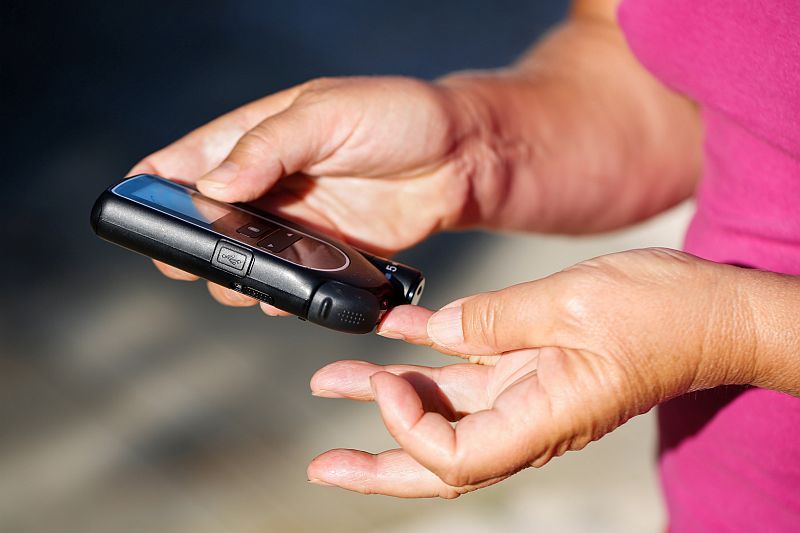

Fewer Diabetes Cases Being Missed
More Americans than thought getting second test to confirm diagnosis, study showsTuesday, October 24, 2017

TUESDAY, Oct. 24, 2017 (HealthDay News) -- Although the number of people diagnosed with diabetes is still on the rise, the good news is that most people with the disease know they have it, a new study shows.
The research suggests that over the past two and a half decades, the percentage of undiagnosed cases has dropped significantly.
"If you're going to your doctor, you probably don't have to worry about undiagnosed diabetes," said study author Elizabeth Selvin, a professor of epidemiology at Johns Hopkins University's Bloomberg School of Public Health.
Selvin explained that previous estimates suggested that over a quarter to 30 percent of people with diabetes probably didn't know it. But those estimates assumed that doctors were only doing one test for diabetes and not following up with a confirmatory second test, as the American Diabetes Association recommends.
However, "we found that's not consistent with how diabetes is diagnosed in clinical practice. In practice, an abnormal finding is confirmed with a second test for the diagnosis. When you use two tests, we see that we're doing a good job with screening and diagnosing diabetes," Selvin said.
In fact, the two-test method seems to capture about 90 percent of all diabetes cases, the researchers noted.
Selvin and her colleagues used data from U.S. National Health and Nutrition Examination Surveys done from 1988 to 1994 and from 1999 to 2014.
The surveys showed that when the research began in 1988 to 1994, there were about 10 million adults with diabetes and confirmed undiagnosed diabetes (that means people who just had one test and didn't get a follow-up test). By 1999 to 2014, there were 25.5 million adults with diabetes or undiagnosed diabetes.
The new research revealed that the number of undiagnosed cases as a percentage of all diabetes dropped from more than 16 percent to slightly less than 11 percent over 26 years.
People who were undiagnosed were more likely to be overweight or obese, older, or a racial or ethnic minority. They were also less likely to have health insurance or access to health care, the study found.
"What we need to figure out is how to target our screening and prevention efforts to the group that actually is undiagnosed. Some of the people being missed have very high [blood sugar levels] and the efforts should be concentrated on getting those people to the clinic," Selvin said.
The findings were published Oct. 23 in the Annals of Internal Medicine.
Dr. Anne Peters is director of the clinical diabetes program at the University of Southern California Keck School of Medicine in Los Angeles. She wrote an editorial that accompanied the study.
"I think there are fewer undiagnosed cases than we used to think, but there are still a lot of people who are undiagnosed," Peters said.
"People with risk factors need to get tested. But people get afraid of the stigma. They get afraid of the disease. But diabetes doesn't have to be awful. People don't have to give up. We need a lot more public awareness and a lot more prevention," she said.
And that doesn't mean you have to lose 100 pounds. "Losing 15 pounds can make a big difference. Just walking 30 minutes a day, five days a week is incredibly beneficial. Take diabetes on in bite-sized pieces," Peters advised.
"There are so many new ways to treat diabetes. Almost everything has changed in the past 30 years. But the earlier you start treatment, the better. Some things are better to face," she said.
SOURCES: Elizabeth Selvin, Ph.D., M.P.H., professor, epidemiology, Johns Hopkins University Bloomberg School of Public Health, Baltimore; Anne Peters, M.D., director, clinical diabetes program, Keck School of Medicine, University of Southern California, Los Angeles; Oct. 23, 2017, Annals of Internal Medicine
HealthDay
Copyright (c) 2017 HealthDay. All rights reserved.
News stories are written and provided by HealthDay and do not reflect federal policy, the views of MedlinePlus, the National Library of Medicine, the National Institutes of Health, or the U.S. Department of Health and Human Services.
- More Health News on
- Diabetes
- Health Screening



























.png)












No hay comentarios:
Publicar un comentario